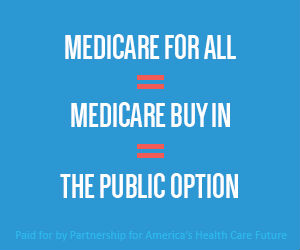Overnight Health Care — Presented by Partnership for America’s Health Care Future — House committees unveil surprise billing legislation | US waiting for China to accept coronavirus help | Facebook vows to fight vaccine misinformation after child’s death

Welcome to Friday’s Overnight Health Care.
Two House committees unveiled their own versions of legislation to stop surprise billing. Meanwhile, in the latest on the coronavirus outbreak, U.S. health officials are still waiting on China to accept their help, and the State Department plans to spend up to $100 million to help countries combat the virus.
We’ll start with the news on surprise billing…
Big day for surprise billing legislation
Both the House Ways and Means Committee and House Education and Labor Committee released their proposals.
Quick facts:
- Ways and Means: Protects patients from surprise bills and uses arbitration to determine how much the insurer pays the doctor, though the arbiter must take into account the median rate for that service.
- Education & Labor:Also protects the patient and is similar to a proposal from the House Energy and Commerce Committee and the Senate health committee in December, which sets the payment rate based on the median rate with an option for arbitration on high-cost bills.
Battle lines: The Federation of American Hospitals endorsed the Ways and Means bill, which is friendlier to hospitals worried about payment cuts in the other approaches.
The consumer group Families USA backs the Energy and Commerce/Education & Labor approach, saying it does more to lower health care costs.
Rep. Donna Shalala (D-Fla.), a former secretary of Health and Human Services, said Friday she plans to vote against the bipartisan Education and Labor measure to protect patients from surprise medical bills unless it is changed. She instead supports the Ways and Means bill.
“I have problems with it because it’s not balanced,” Shalala said of the Education and Labor proposal. “What I mean by that is the insurance companies are the big winners, the hospitals in my district and their employees get hurt and they’re the largest employers in my district. I can’t support a bill that will hurt the hospital workers in my district.”
U.S. still waiting for China to accept help
U.S. health officials are still waiting on China to accept their offer to send experts from the Centers for Disease Control and Prevention (CDC) to help with the coronavirus outbreak.
“At this point, it’s really a decision for the Chinese,” Health and Human Services Secretary Alex Azar told reporters Friday. “We have made the request now for almost a month, saying we are ready, willing, and able” to support the Chinese government with their response to the coronavirus.
Azar said HHS provided the World Health Organization (WHO) with the names of 13 individuals from U.S. agencies such as the CDC, the National Institutes of Health and HHS’s Biomedical Advanced Research and Development Authority. Those people are among the 25 members of the multinational WHO team.
“We continue to expect fully that President Xi will accept that team that the WHO has put together,” Azar said.
At the same time, the U.S. will be spending up to $100 million to help the WHO, China, and other countries “contain and combat” the coronavirus, according to Deputy Secretary of State Steve Biegun.
Facebook vows to combat vaccine misinformation after 4-year-old’s death from flu
Facebook is renewing its pledge to combat “vaccine misinformation” after the death of a young child from the flu.
According to NBC News, the 4-year-old died after his mother followed advice given to her by the members of one of Facebook’s largest anti-vaccine groups.
In a statement to NBC, Facebook said it is “working hard” to reduce vaccine misinformation “everywhere on the platform, including in private groups.”
But the child’s death shows the limits of Facebook’s efforts. The company has been reluctant to ban anti-vaccine groups altogether, and instead has implemented policies meant to better promote credible content.
In March, Facebook announced it was taking steps to limit the circulation of anti-vaccine content on its platform. Under the plan, Facebook will no longer promote anti-vaccine groups and pages in search results, and will not surface them in users’ newsfeeds.
Sponsored Content — Presented by Partnership for America’s Health Care Future
Any one-size-fits-all new government health insurance system, whether it’s called Medicare for All, the public option or Medicare buy-in, would mean higher costs for patients. Learn more.
What we’re reading
VA secretary looked for dirt on a House staffer who reported sexual assault in a VA hospital, complaint says (Pro Publica)
Over 200 medical professionals in the South oppose bills targeting trans youth (NBC)
Women shouldn’t get a bill for an IUD … but sometimes they do (Kaiser Health News)
‘We need everyone for this’: U.S. hospitals harnessing resources to brace for any spike in coronavirus cases (Stat)
State by state
Massachusetts to end health insurance program it once called a cost-saver. The reason: Costs are too high (Boston Globe)
Virginia poised to become first southern state banning LGBT discrimination (The Washington Post)
Copyright 2023 Nexstar Media Inc. All rights reserved. This material may not be published, broadcast, rewritten, or redistributed.


